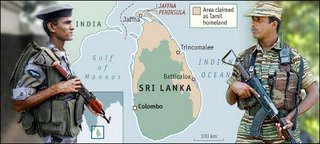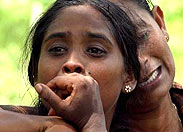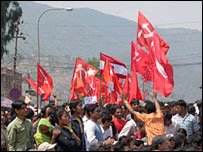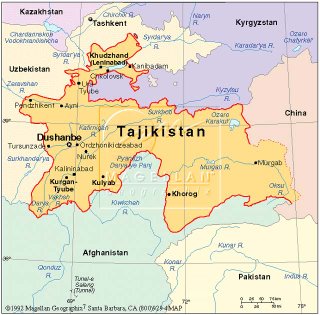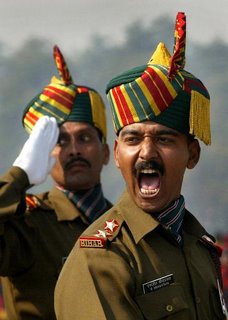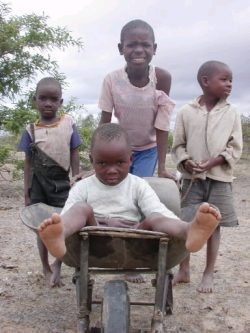Tigers Tell Of Death, Destruction Under Government Bombardment
 Agence France Presse
Agence France PresseApril 28, 2006
SAMPUR, Sri Lanka - Houses in this rebel-held town were deserted and streets eerily empty on Friday, three days after Sri Lanka’s military pounded it with a fiery blitz that a Tamil Tiger political officer said killed 15 people and injured 25.
Smashed buildings, tangled powerlines and small blood-stained bomb and shell craters gave a hint of the mayhem wreaked during Tuesday’s government strike on the town in Trincomalee district of northeastern Sri Lanka.
Now sheltering at a school in the nearby village of Pattalipuram, residents of Sampur told how they had fled in the night to escape the rain of destruction that fell from the sky.
“It was frightening. It didn’t seem to stop,” said T. Jeyathas, who reached the school with his small family of four at 3:00 am on Wednesday, having walked as fast as they could along dark pathways praying they wouldn’t be hit by a rocket or bomb.

Others told similar stories of their terror in the night and said they were too afraid to return to their homes even though there had been no bombings since Wednesday.
“We’ll wait here till we are sure it is safe,” said Vijay Kumari, who lives in the largest city Colombo but was visiting relatives in Sampur when the attacks began.
Liberation Tigers of Tamil Eelam (LTTE) political chief from Trincomalee district, S. Elilan, told AFP about 600 rockets and a dozen 500-pound (227-kilogram) bombs fell on Sampur during what he said was a 16-hour assault.
Deaths and destruction
Showing photographs of disfigured corpses trapped in rubble, and of a headless woman lying in the sand still cradling her small dead daughter, he said the government strikes had killed 15 people and injured 25. Another picture showed a cow hit by a rocket.
Nearly 4,700 families -- 17,858 people -- were displaced, he said, adding that only civilians were killed or injured and the toll could have been higher.
“We had advance warnings of the attacks so we warned everyone and they moved to safer places,” he said.
Elilan, unarmed and dressed in civilian clothes, said 26 houses had been destroyed but the final number damaged was still being assessed.
The government strike came from aircraft, multi-barrel rocket launchers and artillery fire, he said at the Tigers’ district political headquarters in Sampur about 80 kilometres (50 miles) from Trincomalee by road but a lot closer by sea.
“The situation is like a war. People are being killed by bombs and artillery fire. You can’t say there’s peace in Sri Lanka anymore,” Elilan said.
The military, saying it was acting in self-defence, launched the strikes after a woman pretending to be pregnant blew herself up at army headquarters in Colombo, about 260 kilometres from Trincomalee, on Tuesday.
The suicide bombing targeted the head of the army, leaving him severely wounded. He was among 30 people hurt while 10 others -- mostly security personnel -- were killed.
Elilan denied the LTTE was behind the suicide bombing and bemoaned the fact the military had struck out at the rebels, saying it was a violation of the ceasefire the two sides signed in 2002.

Asked if the LTTE was planning to retaliate, Elilan did not answer directly but said: “Because of the attack in Colombo, 15 Tamils died and thousands have been displaced. We have no safeguards for Tamils. We have to look after our own protection. We are only fighting for freedom of Tamils.”
Three decades of ethnic bloodshed in Sri Lanka have claimed more than 60,000 lives. The Tigers are fighting for a homeland for their minority community.
Foreign donors were to meet Friday in Oslo in a bid to save the four-year-old ceasefire under severe strain after the latest violence.








